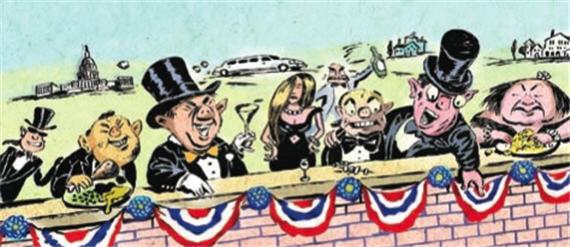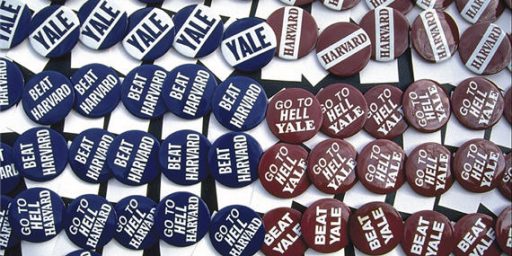Why Our Columnists Stink
David Brooks is wistful for the noblesse oblige of the elites of yore.
In a column titled “Why Our Elites Stink,” David Brooks reviews Chris Hayes’ new book Twilight of the Elites, which argues that today’s meritocratic elites have rigged the game in their favor, and finds it wanting. I haven’t read Hayes’ book and thus have no opinion as to his analysis of the current situation. But Brooks’ is of the worst possible sort, romanticizing the past while blithely unaware of his own role in the present.
I’d say today’s meritocratic elites achieve and preserve their status not mainly by being corrupt but mainly by being ambitious and disciplined. They raise their kids in organized families. They spend enormous amounts of money and time on enrichment. They work much longer hours than people down the income scale, driving their kids to piano lessons and then taking part in conference calls from the waiting room.
Phenomena like the test-prep industry are just the icing on the cake, giving some upper-middle-class applicants a slight edge over other upper-middle-class applicants. The real advantages are much deeper and more honest.
It’s no doubt true that today’s elites engage in these activities. Those who can afford it send their kids to the best private schools or at least move to neighborhoods with the best public schools. They provide every conceivable advantage to help their kids build their resumes, improve their grades and test scores, and otherwise succeed. But it’s absurd to argue that this simply gives their kids an advantage over the kids of other elites who are less diligent; it pretty much excludes those without the means to participate in this scheme from the race.
The current credential- and achievement-based meritocracy is more open than the older one based on family connections. But it’s by no means open. To be sure, the truly gifted children of the poor may occasionally rise to the top despite having none of the advantages Brooks outlines–and that was almost precluded under the old system. Still, kids whose parents are wealthy products of elite institutions have a ridiculous competitive advantage in following that same path.
The corruption that has now crept into the world of finance and the other professions is not endemic to meritocracy but to the specific culture of our meritocracy. The problem is that today’s meritocratic elites cannot admit to themselves that they are elites.
Everybody thinks they are countercultural rebels, insurgents against the true establishment, which is always somewhere else. This attitude prevails in the Ivy League, in the corporate boardrooms and even at television studios where hosts from Harvard, Stanford and Brown rail against the establishment.
As a result, today’s elite lacks the self-conscious leadership ethos that the racist, sexist and anti-Semitic old boys’ network did possess. If you went to Groton a century ago, you knew you were privileged. You were taught how morally precarious privilege was and how much responsibility it entailed. You were housed in a spartan 6-foot-by-9-foot cubicle to prepare you for the rigors of leadership.
Countercultural rebels?! What is this, 1972?
No, the difference is that yesterday’s Old Money elites at least had some inkling that their position of privilege was unearned. Today’s elites, by contrast, are quite sure that they’ve earned it. Why, they’ve worked harder, gotten better grades and test scores, and are smarter and more virtuous than those who went to State U. They deserve everything they have!
Indeed, that attitude infects Brooks’ column–and, indeed, his columns.
The best of the WASP elites had a stewardship mentality, that they were temporary caretakers of institutions that would span generations. They cruelly ostracized people who did not live up to their codes of gentlemanly conduct and scrupulosity. They were insular and struggled with intimacy, but they did believe in restraint, reticence and service.
This is almost certainly true of “the best” of the WASP elites. But, of course, “the best” of our current elites are decent and scrupulous in their own way, too. But let’s not kid ourselves that there was once some halcyon age where our betters were so much better. Our Founding generation owned slaves, for goodness sakes, and Jim Crow persisted for generations. Nor was it just blacks, Mexicans, Indians, Chinese, Italians, and other non-WASPs that were treated poorly; lower class whites were expected to know their place, too.
Beyond that, our current elites face a far greater degree of scrutiny than their predecessors. When the likes of Franklin Roosevelt and John Kennedy led double lives, the press corps covered it up on the grounds that it wasn’t the public’s business. Not only did they hide the fact that both men were carrying on extra-marital affairs while in the White House but they actually went to great lengths to cover up the fact that FDR was in a wheelchair. How much better a president would Bill Clinton have seemed in such an environment? Indeed, this applies across the board to our modern elites, not just our politicians. Sports stars and business leaders live under the glare of a spotlight unimaginable twenty, much less fifty, years ago.







Nice review and spot on. I think Brooks, as he ages, is becoming more like Peggy Noonan.
I have never bought into the “things were better in the old days” argument. You can always find groups, people, institutions or policies in the past that may have been better, but you can just as easily find ones that were worse. Much of the time we even have trouble agreeing on what is actually better or worse. I think Brooks has fallen victim to the mythology that surrounds many of our important historical figures that gets built up after they die. Vested interests play a role in promoting myths about key figures, and even honest historians tend to varnish over the worst on those they choose to write about.
Steve
Fine column, Mr. Joyner.
I’m not quite on board with the statement regarding the previous elites believing their position was “unearned”, though. I do believe there were much stronger constraints on what constituted proper elite public behavior, both from the federal (mixed on states) government officials, from the educated and civically engaged middle-class, and from fellow elites.
All three of the above have collapsed – all levels of government have largely acquiesced to deregulatory demands of business masters, the middle-class may vote, but there is much less civic involvement than in the past (much of it due to immensely higher demands from middle-class jobs), and modern elites are steadily advancing towards an American neofeudalism.
David Brooks, of course, has raised his pompons for all of the above. In the name of American Freedom.
Textbook case of DSM-defined “projection” by Brooks.
Excellent. I sometimes wonder whether even Brooks really believes himself when he writes nonsense like this.
No man is a hero to his valet. We know too much about our modern elites even to believe that they are elite or, at least, more worthy of what they’ve got than thousands of other people who are just as smart, hardworking, etc.
I might add that I believe that it is inevitable that every meritocracy, however merit is defined, to become debased into a mediocre and self-serving aristocracy over time. Once you’ve achieved wealth, prestige, power, etc. by your “merits”, many if not most people start trying to figure out how to ensure that their kids retain that wealth, prestige, power, etc. You exert your influence to tweak the rules to guarantee that. The whole shebang becomes a game of Calvinball.
Also, the Feiler Faster Thesis strongly suggests that any form of elitism will have difficulty in surviving for long.
Of course attacking Brooks means that everyone gets to look past Chris Hayes’s errors in his book where Mr. Hayes promoted the solutions of more quotas, more affirmative action, and more government control of the private sector.
Also, Mr. Hayes totally avoided the issue that it is Asians more than upper class whites are winning the credentials and merit race.
And the joke about Ivy League outsiders has to do with Mr. Hayes’s weekend show on MSNBC where I watched two Brown, A Yale, and a Columbia graduates discussing how to fix bad public schools.
If anyone wants to learn the standard thought process of the liberal Manhattan elites, all they have to do is watch Chris Hayes.
I laugh…as I sit in my office working on a Sunday morning. Brooks is an idiot.
@superdestroyer: I specifically note that I’m not commenting on the merits of Hayes’ book on account that I haven’t read it.
@C. Clavin: My anecdotal experience is that two kinds of people work really long hours: aspiring professionals and others with rewarding careers (including the self-employed) on the one hand and those earning low hourly wages and therefore needing more than 40 hours just to scrape by one the other. Some types of service workers have to work Sundays, of course, since people need services all week long, but most don’t work more than 40 hours a week.
Only a person totally lacking in self-awareness could write that statement.
David, if they didn’t think they were elite, as in better than the rest of us, they could not possibly justify to themselves the vast wealth they accrue daily. In their own minds, they have to be better than every one else… Because if they aren’t, they are just lucky (born of the right parents, born at the right time, born with the right talent, etc), and leeches to boot.
Did someone say yesterday that you needed to be in the 0.1% to be “rich?”
I guess 99.9 percent of us have no worries.
In fact, the biggest problem with both Brooks´ column and Hayes´ book is that no one can precisely explain what is merit to talk about meritocratic elites. Meritocracy generally makes sense in places plagued by cronism, cronism in a fair bigger scale than in the United States.
Even so, one may argue that choosing your academic elites using a very complicated written test (Like China and Brazil do) is hardly meritocratic at all.
@john personna: Indeed. But, aside from the sports and entertainment industries, inheritance, the lottery, or selling your startup to Google or Facebook, the chief path to the top is an elite education. So, to the extent that it’s a largely closed path, it’s problematic.
@André Kenji de Sousa: But Brooks and Hayes mean pretty much the same thing: the sort of people who go to the great universities and then either graduate or professional school at one of those universities or enter the knowledge industry at an elite level. For the most part, those paths are indeed meritocratic in the sense that almost everyone is rather intelligent. What they don’t get, as Dave Schuler notes, is that a lot of equally or more intelligent people don’t get to go down that path for a variety of reasons have little to do with merit.
@James Joyner:
Where I was really going was that some larger chunk of us should acknowledge our fortune, and not put it off on some vanishingly small super-elite.
We need to grade on a wider curve.
@superdestroyer: James stated he wasn’t commenting on Hayes book because he hadn’t read it. You might make a better impression with your comments if you took timeto read the entire post.
Well-written, James.
@Ben Wolf:
But James could have actually looked up some reviews of Hayes’ book and realize that Hayes is a member of the elite (Hunter College High School, Brown University) who lives the life of an NYC elite liberal.
The real question is how does is help the middle class to increase the number of positions at the top for quota hires and fewer positions for the middle class. How does it help to eliminate the elite by having open borders and unlimited immigration that Mr. Hayes supports that will drive down wages in more career fields.
Maybe it would be nice if the elite in the U.S. spent less time in status seeking in NYC and SF and more time thinking about the long term consequences of the policies that they support (degrading public schools, open borders, very high taxes, and the elimination of manufacturing in the U.S. ).
@superdestroyer: It would be silly for James to reference reviews of Hayes’ book for a post that isn’t about Hayes’ book. It is also more than foolish to rely on what reviewers say about a book rather than reading it ones-self.
James Joyner:
But in every country of the world the kind of “elite” that both Hayes and Brooks are talking are people that went to great universities. The difference is how you choose people that goes to these universities.
My impression is that the meaning of “meritocratic” is a little lost in the air here.
David Brooks is so tiresome. Brooks, like so many other conservatives, is obsessed with an old and stale stereotyped view of graduates of elite colleges and universities that dates back to the cultural revolution of the 1960s:
Seriously, he just does not get out enough.
Maybe it comes down to this: Brooks grew up in New York City and graduated from the University of Chicago, and it seems that he can’t get over the fact that a great number of the graduates of the nation’s elite colleges and universities are not politically conservative as he is.
He’s too young (51) to be that guy who’s yelling at the kids to get off his lawn.
@Ben Wolf:
I think the real question here is why neither Brooks nor Joyner wrote a column relating directly to superdestroyer’s monomaniacal obsession with the Apocalyptic Coming Of The Single-Party Brown People State.
I smell cover-up.
An important point is missing here: in fact, due to the fact that Ivy League institutions heavily relies on things like interviews and curriculum it´s much easier to see poor or minority students in a Ivy League institution than it´s is for a poor student in Latin America or Asia to enter any prestigious Public University.
That´s one of the reasons why there are much more Blacks in the United States elites than there are in a country like Brazil, where using North American Standards something like 60% of the population would be considered Black.
@al-Ameda: I always love it when someone stereotypes while complaining about stereotyping. It’s so stereotypical.
@Ben Wolf:
Who may not have read the book, either.
@al-Ameda:
I think Mr. Brooks knows that the vast majority of Ivy graduates are liberal. There is a huge amount of pressure of the elite to mouth the “correct” and “proper” ideas and views and few of them venture very far from the views that are expressed every week by people like Chris Hayes on his television show.
Of course, what is most interesting is how the elite live their lives versus what they say that they believe.
@Dave Schuler:
I’m not entirely with you on this. I have a book that has a 4.6 (out of 5) star rating on Goodreads.com. I am currently almost halfway done writing that book.
@Dave E.:
and I love it when someone loves it when someone else stereotypes while complaining about stereotyping. It’s so stereotypical and circular.
I would so like to put that a55hat into a strawberry field down here in Florida and see where his work ethic gets him.
@michael reynolds:
I always find it amazing how some books, usually by political writers, can have hundreds of reviews on Amazon within a day after first being available for sale.
@superdestroyer:
What do you have in mind?
That they should live in ghettos? Put their children in lousy schools?
@Doug Mataconis:
Time travel is becoming more and more common nowadays. I blame CERN.
@Doug Mataconis:
I’m surprised that the authors have that many friends and relatives.
@al-Ameda:
That the elites should not call the middle class racist and rednecks when those middle class whites and Asians make exactly the same life decisions as the elites. Yet, the elite always call the middle class racist when the middle class opposes busing, quotas, or affirmative action (See Seattle, Louisville, Michigan, or even Fairfax Virginia) while the elites isolate themselves from poor minorities.
@superdestroyer:
News Flash! Elites, like every other human being, are hypocrites!
@al-Ameda:
Speaking of stereotypes:
@superdestroyer:
@superdestroyer:
So you do think that “the elites” – which includes people like Rush Limbaugh, Bill Gates, Goerge Soros, maybe Larry Ellison, or even Mitt Romney should live in the ghetto.
@al-Ameda:
I believe that all elites and especially liberal elites should shut up about diversity, social justice, and social engineering unless they are willing to live in the ghetto and send their own children to schools that are majority black and Hispanic. I think liberal elites need to stop being hypocrites or just shut up and allow everyone else to live their lives like they do.
I expect the elite to follow the first rule of leadership: Never ask anyone else to do something they are not willing to do themselves such as having their family members exposed to the underclasses.
Elites often have certain advantages and many of them. A child of a lawyer often has advantages on becoming a lawyer. Having good parents, coaches, teaches, friends, etc often gives someone a certain advantage over those who don’t. The key question is if one exploits those advantages or not. Even if they do, it doesn’t guarantee they will be better than someone who doesn’t have them. It only gives them a better chance. Often like in chess, it is not simply the one piece that determines the winner but the alignment of many pieces. People though tend to focus on the one piece even though the winner can often win without that particular piece.Sometimes not.
It’s not that complicated until people try to use someone “advantages” or “disadvantages” as excuses wither in positive or negative way.
“No, the difference is that yesterday’s Old Money elites at least had some inkling that their position of privilege was unearned. Today’s elites, by contrast, are quite sure that they’ve earned it. Why, they’ve worked harder, gotten better grades and test scores, and are smarter and more virtuous than those who went to State U. They deserve everything they have!”
I haven’t seen a G-D piece of evidence in favor of that – and certainly not from Brooks, who wouldn’t know evidence if it were in front of him with a sign saying ‘evidence!’.
The upper class have always had ways of justifying their wealth, whether it’s ‘will of God’, ‘superior blood’, ‘sign of Grace’ or whatever suited the times. And for every Carnegie library, there were untold numbers of people who bled so that Carnegie and his like could accumulate that wealth.
Elites, like the poor, shall always be with us. As Thomas Sowell asserts in “Intellectuals and Society”, a majority, as I remember it, of the really difficult problems in the nation have been fostered by the intellectual elites. They should, in his opinion, be nowhere near the levers of power and influence. Public intellectuals, he goes on to say, those who come out from their sphere of expertise to deliver their wisdom on subjects far and wide, are especially dangerous and irresponsible, for they usually assume absolutely no responsibility for their ideas when taken into practice and fail, but move on rapidly to the next hairbrained, cerebral popcorn idea immediately.